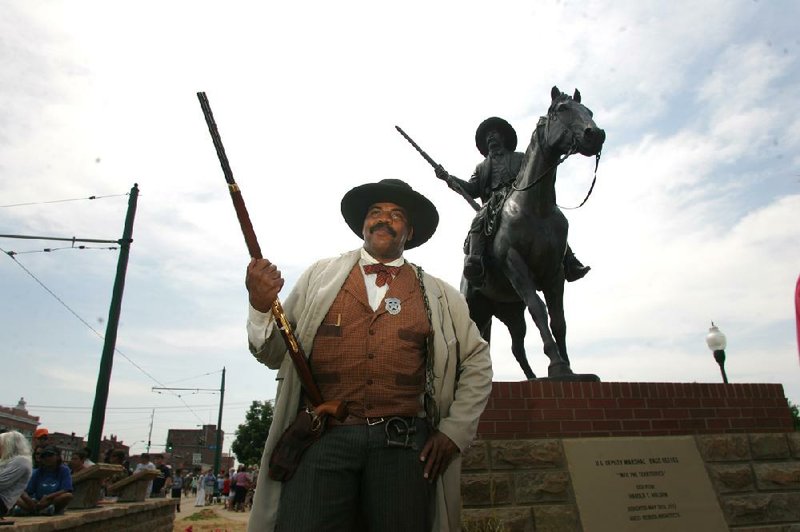FORT SMITH — Rooster Cogburn was fiction. Bass Reeves was real.
On Saturday, hundreds from Fort Smith and beyond expressed their thanks for that.
In downtown Ross Pendergraft Park under a sweltering Memorial Day weekend sky, they celebrated the true life story of Deputy U.S. Marshal Bass Reeves.
Politicians, law enforcement officials, singers, kinfolk and one rap artist recalled his life. It was better than anything the movie studios could have imagined, they said.
Born into slavery about 1838 and illiterate because he had no schooling, Reeves became “one of the greatest lawmen this country has ever had,” Chancery Judge Jim Spears told the crowd.
The ceremony’s highlight came when the Bass Reeves Legacy Initiative group of Fort Smith, after more than five years of dreams and fundraising, unveiled a $300,000 bronze equestrian statue of the Old West deputy marshal.
The statue, called “Into the Territories,” depicts the mustachioed Reeves sitting on his horse and cradling a rifle as he looks across the Arkansas River into Oklahoma. It was the work of Oklahoma sculptor and artist H.T. Holden.
“I don’t understand places that are either embarrassed about their western heritage or don’t celebrate who they are,” Holden told spectators Saturday. He drew cheers when he added, “Fort Smith is not one of those.”
Starting in 1875, Reeves served under “Hanging” Judge Isaac C. Parker. He arrested more than 3,000 men and killed 14 in the line of duty, speakers said. Reeves memorized his arrest warrants and other papers. He was known as a fast gun and expert tracker, but used disguises and tricks to capture criminals without violence, when possible.
“He was one of our bravest and most legendary deputies,” said guest speaker Carl Caulk, assistant director of the U.S. Marshals Service.
“Everybody loves Bass Reeves,” said Sue Robison, who, with her husband Floyd, came dressed in period clothes as Judge Parker and his wife Mary.
“He was over 6 feet tall. He was Judge Parker’s favorite deputy,” Robison said of Reeves. “There’s a story that one outlaw heard Bass was looking for him, and that outlaw just gave up and turned himself in.”
Reeves’ real life bore no resemblance to the sometimes unreliable and inebriated Deputy U.S. Marshal Rooster Cogburn character, played by John Wayne and Jeff Bridges in the True Grit movies.
Reeves passed high moral values to his children and other family members, said Federal Administrative Law Judge Paul Brady, a grandnephew of Reeves who spoke. Those values included “dedication to his work ... faith in God, love of family and pride in serving his country,” he said.
“You not only honor Bass Reeves today,” said Brady, 84. “You honor yourselves, you honor Fort Smith and you honor America.”
Brady, who lives in Atlanta, said after Saturday’s event, “I couldn’t have imagined this could have happened. There are cities with more people, more money and larger black populations that probably would not have been able to do the same thing.”
Spears and Craig Pair of Fort Smith led the formation of the nonprofit Bass Reeves Legacy Initiative. The group raised the money for the statue through two raffles and more than 1,000 private donations.
Speakers remembered how Reeves lived out his life with his family in nearby Muskogee, Okla., working as a police officer. When he died in January 1910, hundreds attended his funeral, according to the legacy initiative group. His grave site in or around Muskogee has since been lost.
Three songs in his memory punctuated Saturday’s ceremony.
“Tall Black Man on a Big Horse,” by Herschel Parker of Hackett, applauded the deputy marshal as “never the first to fire his weapon, but he was standing when the shooting was done.”
Entertainer Bobby Lopez of Fort Smith rapped about the “legendary lawman” who was “absolutely awesome.”
Western entertainer R.W. Hampton of Texas recalled the deputy’s life “from a slave to a freeman ... your legend lives. The legend of Bass Reeves.”
Arkansas, Pages 13 on 05/27/2012
